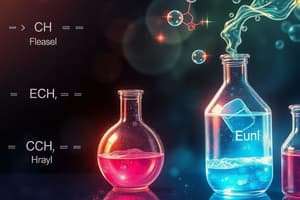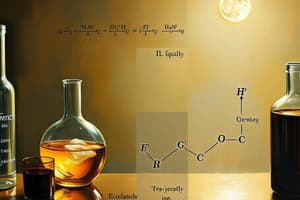Podcast
Questions and Answers
What is the primary process that occurs during a chemical reaction?
What is the primary process that occurs during a chemical reaction?
- The breaking and forming of chemical bonds (correct)
- The combination of two substances to form a new compound
- The formation of new bonds between substances
- The transformation of one substance into another
What type of reaction is represented by the equation Zn + CuSO4 → ZnSO4 + Cu?
What type of reaction is represented by the equation Zn + CuSO4 → ZnSO4 + Cu?
- Synthesis reaction
- Combustion reaction
- Replacement reaction (correct)
- Decomposition reaction
What is the purpose of coefficients in a chemical equation?
What is the purpose of coefficients in a chemical equation?
- To indicate the relative amounts of each substance (correct)
- To separate reactants from products
- To indicate the direction of the reaction
- To identify the type of reaction
What is a characteristic of a well-balanced chemical equation?
What is a characteristic of a well-balanced chemical equation?
What are the substances that undergo a chemical change in a reaction?
What are the substances that undergo a chemical change in a reaction?
What is the purpose of an arrow in a chemical equation?
What is the purpose of an arrow in a chemical equation?
Study Notes
Chemical Reactions
- A chemical reaction is a process that involves the transformation of one or more substances into new substances.
- Chemical reactions involve the breaking and forming of chemical bonds.
Types of Chemical Reactions
- Synthesis Reaction: A reaction in which two or more substances combine to form a new substance. Example: 2H2 + O2 → 2H2O
- Decomposition Reaction: A reaction in which a single substance breaks down into two or more substances. Example: 2H2O → 2H2 + O2
- Replacement Reaction: A reaction in which one element replaces another element in a compound. Example: Zn + CuSO4 → ZnSO4 + Cu
- Combustion Reaction: A reaction in which a substance reacts with oxygen to produce heat and light. Example: 2CH4 + 3O2 → 2CO2 + 3H2O
Chemical Equations
- A chemical equation is a representation of a chemical reaction using chemical formulas and symbols.
- Chemical equations must be balanced, meaning the number of atoms of each element must be the same on both the reactant and product sides.
Components of a Chemical Equation
- Reactants: The substances that undergo a chemical change in a reaction.
- Products: The substances formed as a result of a reaction.
- Coefficients: Numbers placed in front of formulas of reactants or products to indicate the relative amounts of each substance.
- Arrow: Indicates the direction of the reaction, with reactants on the left and products on the right.
Balancing Chemical Equations
- Law of Conservation of Mass: Matter cannot be created or destroyed in a chemical reaction, only transformed.
- Step-by-Step Process:
- Write the unbalanced equation.
- Count the atoms of each element on both sides.
- Add coefficients to balance the equation, starting with the element that appears in the greatest number of formulas.
Tips for Balancing Chemical Equations
- Start with elements that appear in the greatest number of formulas.
- Balance elements that appear in multiple formulas first.
- Check your work by re-counting the atoms of each element.
Studying That Suits You
Use AI to generate personalized quizzes and flashcards to suit your learning preferences.
Description
Learn about the different types of chemical reactions, including synthesis, decomposition, replacement, and combustion reactions. Understand how to write and balance chemical equations, and get tips for balancing them.




